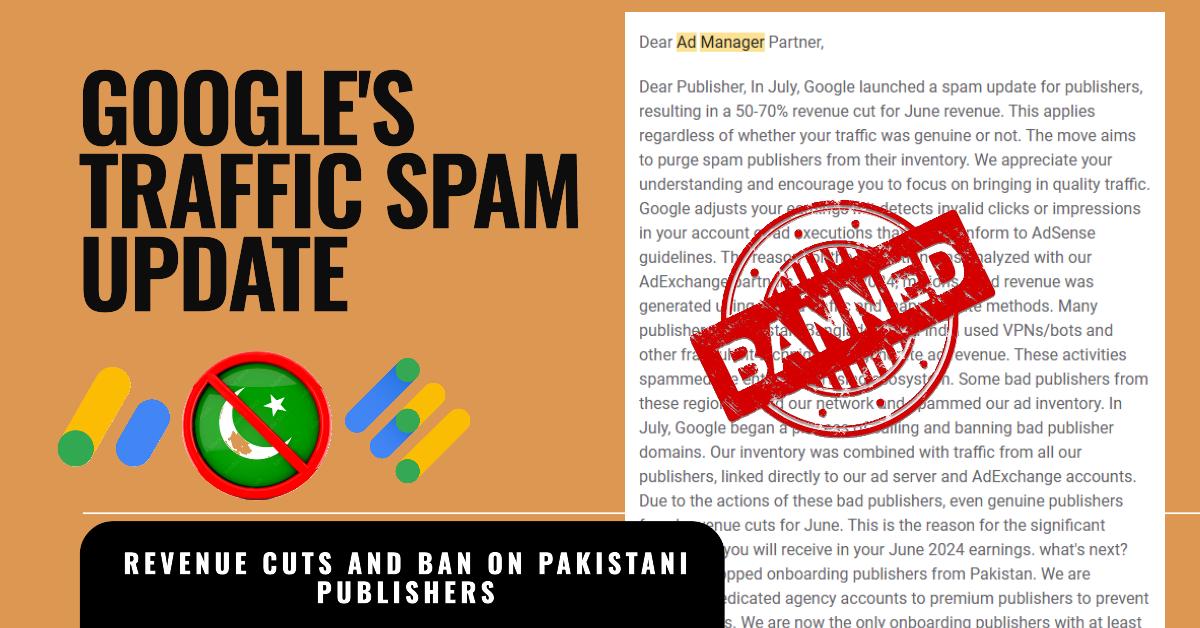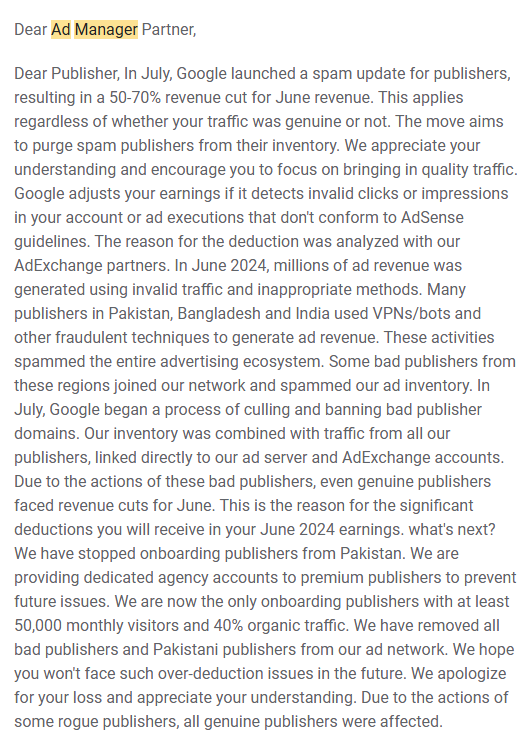(Rumours) Google’s invalid Traffic Spam: Revenue Cuts, Ban on Pakistani Publishers
Google implemented a significant invalid Traffic spam update that has had a profound impact on publishers worldwide. The update, aimed at purging spam publishers from Google’s ad inventory, has resulted in a drastic reduction in revenue for many publishers, with some experiencing cuts of 50-70% for their June earnings. This move by Google is part of an ongoing effort to clean up the digital advertising ecosystem and ensure that only genuine, high-quality traffic is monetized.
Contents
The Catalyst: Fraudulent Traffic and Inappropriate Methods
The decision to roll out this update was driven by a disturbing trend observed in June 2024, where millions of dollars in ad revenue were generated using fraudulent techniques. An in-depth analysis, conducted with AdExchange partners, revealed that a significant portion of this revenue came from invalid traffic, generated by methods such as VPNs, bots, and other deceptive practices. These activities were particularly rampant in regions like Pakistan, Bangladesh, and India, where some publishers resorted to these tactics to inflate their ad earnings.
This widespread abuse not only violated Google’s AdSense guidelines but also spammed the entire advertising ecosystem. The result was a compromised ad inventory that affected advertisers, genuine publishers, and the integrity of Google’s ad platforms.
The Fallout: Revenue Cuts and Publisher Impact
The consequences of these fraudulent activities were far-reaching. In response to the issue, Google began a comprehensive process of culling and banning bad publisher domains in July 2024. This aggressive approach led to significant revenue deductions for many publishers, even those who were not involved in any fraudulent activities. The integration of traffic from all publishers into Google’s ad inventory meant that the actions of a few rogue publishers resulted in collateral damage across the board.
Publishers from Pakistan, Bangladesh, and India were particularly impacted, with some being entirely removed from Google’s ad network. The result was a dramatic reduction in earnings for June, as Google adjusted revenues to account for the invalid clicks and impressions detected in these accounts.
Regional Impact: A Focus on Pakistan
One of the most significant changes following the update was the decision to halt the onboarding of new publishers from Pakistan. This move reflects Google’s commitment to protecting its ad inventory from regions where fraudulent activities were most prevalent. In addition to stopping new publisher sign-ups, Google has also removed existing publishers from Pakistan who were found to be in violation of AdSense guidelines.
New Standards: Stricter Onboarding Criteria
In light of the recent events, Google has introduced stricter criteria for new publishers looking to join its ad network. Going forward, only publishers with at least 50,000 monthly visitors and a minimum of 40% organic traffic will be eligible to join. This change is designed to ensure that only high-quality publishers who can demonstrate genuine traffic are included in Google’s ad inventory.
Furthermore, to prevent similar issues in the future, Google is offering dedicated agency accounts to premium publishers. These accounts provide additional oversight and support, helping to maintain the integrity of the ad network.
What’s Next for Publishers?
While the recent updates have caused significant disruptions, they also signal a positive shift towards a cleaner and more trustworthy digital advertising environment. Publishers are encouraged to focus on generating quality traffic and ensuring full compliance with AdSense guidelines to safeguard their earnings.
Google has expressed regret over the impact of these changes on genuine publishers and has committed to refining its systems to better detect and prevent fraudulent activities. The company’s efforts to remove bad actors from its network are ongoing, and publishers can expect further improvements in the transparency and fairness of the ad ecosystem.
Conclusion
The July 2024 spam update serves as a stark reminder of the importance of maintaining a high standard of traffic quality and adhering to platform guidelines. As Google continues to enhance its systems, publishers must adapt to these new standards to ensure sustainable and legitimate revenue growth in the ever-evolving digital landscape.


